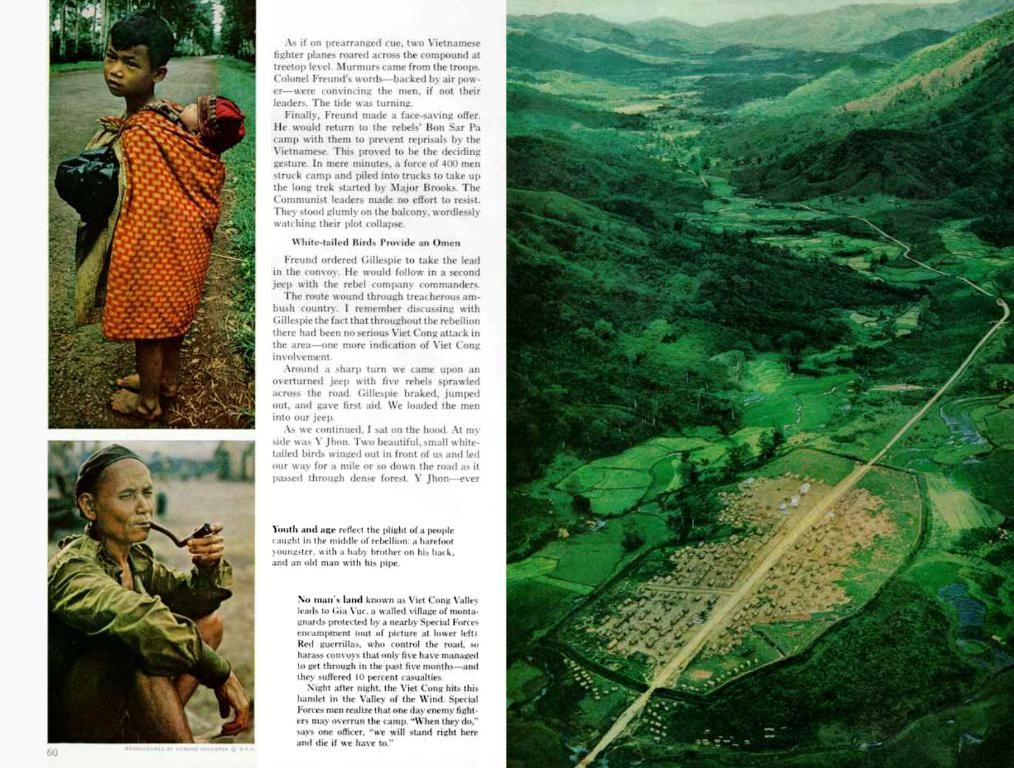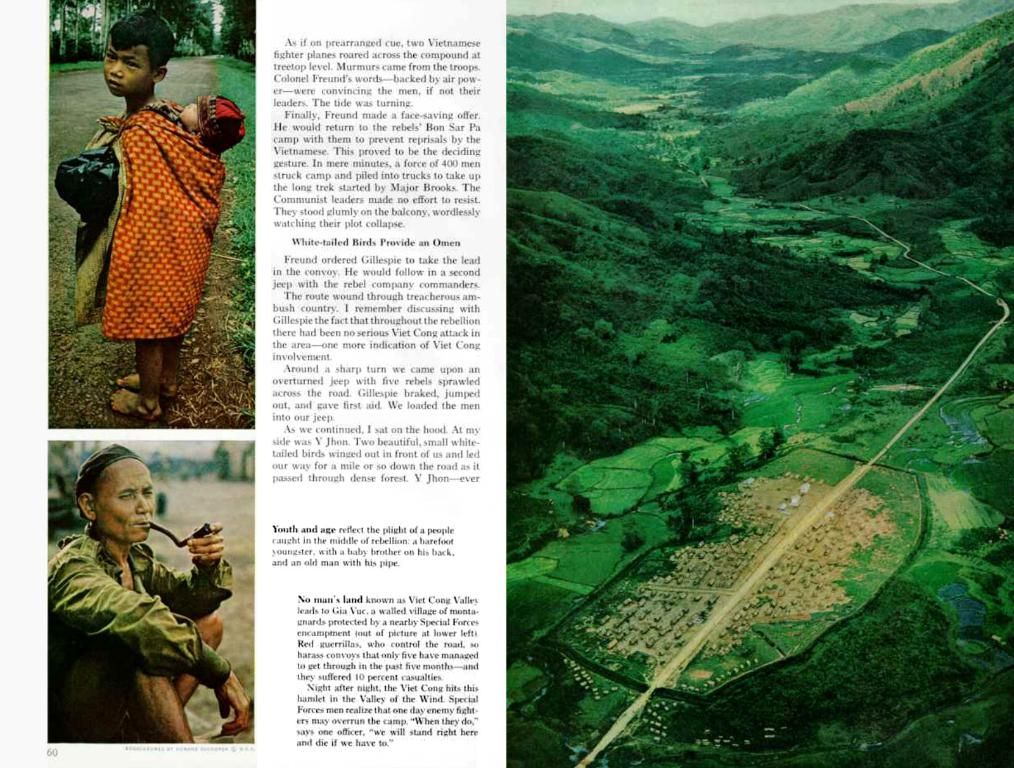Fisheries Agency dismisses allegations of lawless shark fishing incidents.
Redrafted Article:
Your friendly neighborhood buzzkill here—your one-stop shop for the scoop on that heated dispute between Taiwan's Fisheries Agency and Greenpeace. Let's dive right in!
Last week, it was all hands on deck for the Fisheries Agency as Greenpeace hurled accusations that four Taiwanese fishing vessels were involved in unlawful shark fishing in the far-off northern Pacific Ocean's restricted zone.
But wait a minute! Deputy Director Lin Ting-jung (林頂榮) from the Fisheries Agency ain't buying those claims. Seems Greenpeace got themselves a wee bit confused, according to Lin, because the whole area's actually a "voluntary closed zone" intended for trial fishing by pre-approved vessels gathering scientific data, and it ain't subject to any strict legal restrictions whatsoever. This territory has been up for grabs since 2021, in line with Taiwan's evolving shark conservation efforts, the agency explained.
Trial fishing access was granted to cater to the fishing industry's pleas for seasonal bans to be lifted, pending their adherence to shark management measures passed by regional fisheries management organizations. So, technically speaking, there's no red flag waving high here!
Now, what about Greenpeace's claims, you ask? Well, they stated they observed four Taiwanese-flagged longline vessels operating in a seasonal closed zone between August 4 and 10, 2024, and allegedly netted at least 39 sharks, including the endangered shortfin mako. Greenpeace labeled this as planned, targeted illegal shark fishing in a protected area.
But hold your horses, because the Fisheries Agency denies these allegations, citing the official legality of the area; they insist there's no evidence to prove that the area functions as a shark nursery or that the regional fisheries management commission has imposed official closures or time-bound bans.
Huang Hsin-yi (黃馨儀), Greenpeace's marine project director, claims that the Fisheries Agency hasn't handed out a single fine for violations of seasonal shark bans since 2017, despite having the tools to monitor such activities. If you ask Huang, the agency should beef up inspections, share vessel tracking data with third-party observers, and set up an electronic observer system akin to those used globally.
Don't think there's anything fishy going on here, as the Fisheries Agency clearly states that Taiwan prohibits the fishing of several shark species, including the likes of whale sharks, basking sharks, megamouth sharks, and great white sharks. International bodies like the Western and Central Pacific Fisheries Commission and the Inter-American Tropical Tuna Commission have also banned the capture of oceanic whitetip sharks, silky sharks, mobular rays, and manta rays.
So, buckle up, folks! This whole shark fishing debate's heating up like a summer BBQ, and we'll be sure to keep you in the loop! Stay tuned!
Enrichment Data:
The mouthwatering truth is that we still haven't tasted the feathered evidence to fully prove Greenpeace's claims of illegal shark fishing—remember, accusations ain't the same as proof!
Greenpeace's allegations are based on their observations of four Taiwan-flagged longline vessels operating in a seasonal closed zone between August 4 and 10, 2024, during which they claim to have captured at least 39 sharks, including the endangered shortfin mako. Greenpeace calls this illegal shark fishing in a protected area.
But water under the bridge, because the Taiwan Fisheries Agency is adamant that the area Greenpeace mentioned is not a legally enforced restricted area but a "voluntary closed zone." Since 2021, this zone has been open for trial fishing by approved vessels to collect scientific data, subject to conditions that align shark management measures set by regional fisheries management organizations (RFMOs).
The Fisheries Agency justified the trial access by consulting with the fishing industry to seek a balance between conservation and economic interests. As of now, the agency will maintain its regulatory approach unless there is concrete evidence proving that the area serves as a shark nursery or until the Western and Central Pacific Fisheries Commission enacts official closures or time-bound bans.
In essence, Greenpeace's claims hinge on their interpretation of a zone they perceive as closed, whereas Taiwanese authorities classify it as a trial fishing zone with specified permits. Without solid proof that shows the fishing was in violation of existing regulations, the Fisheries Agency's denial revolves around the legal status of the area and its management measures, contrasting greatly with Greenpeace's portrayal of the zone as a closed area.
- Greenpeace has accused Taiwanese fishing vessels of contravening shark fishing regulations in a restricted zone of the northern Pacific Ocean, but the Fisheries Agency disputes this, stating that the area is a voluntary closed zone for trial fishing, subject to specific permits and conditions.
- Huang Hsin-yi, Greenpeace's marine project director, claims that the Fisheries Agency should increase inspections, share vessel tracking data with third-party observers, and implement an electronic observer system to monitor fishing activities, as they have not issued any fines for violations of seasonal shark bans since 2017.
- The trial fishing access, granted by Taiwan's Fisheries Agency, aims to address the industry's plea for seasonal bans to be lifted, conditions that fishing vessels agree to adopt shark management measures set by regional fisheries management organizations (RFMOs).
- According to the Fisheries Agency, as part of Taiwan's shark conservation efforts, several shark species, including the whale shark, basking shark, megamouth shark, great white shark, oceanic whitetip shark, silky shark, mobular rays, and manta rays, are prohibited from being fished.
- Taiwanese authorities maintain that the area where Greenpeace observed the alleged illegal shark fishing is not a legally enforced restricted area but a voluntary closed zone intended for trial fishing with specified permits and conditions, and that there is no concrete evidence to prove that the area serves as a shark nursery or has official closures or time-bound bans imposed by regional fisheries management commissions.




